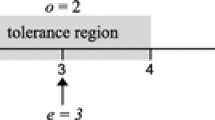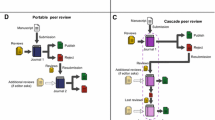Abstract
For improving the performance and effectiveness of peer review, a novel review system is proposed, based on analysis of peer review process for academic journals under a parallel model built via Monte Carlo method. The model can simulate the review, application, and acceptance activities of the review systems, in a distributed manner. Simulation experiments are operated on two distinctive review systems. Significant advantages of the novel system are shown by the results.














Similar content being viewed by others
Data availability
The data in this paper is generated via simulations.
References
Wager, E., Jefferson, T.: Shortcomings of peer review in biomedical journals. Learn. Publ. 14, 257–263 (2001)
Tan, Z., Cai, N., Zhou, J., et al.: On performance of peer review for academic journals: analysis based on distributed parallel system. IEEE Access 7, 19024–19032 (2019)
Resnik, D.B., Smith, E.M.: Bias and groupthink in science’s peer-review system. In: Allen, D.M., Howell, J.W. (eds.) Groupthink in Scence, pp. 99–113. Springer International Publishing (2020)
Dadkhah, M., Kahani, M., Borchardt, G.: A method for improving the integrity of peer review. Sci. Eng. Eth. 24, 1603–1610 (2018)
Prechelt, L., Graziotin, D., Fernandez, D.M.: A community’s perspective on the status and future of peer review in software engineering. Inf. Softw. Tech. 95, 75–85 (2017)
Faggion, C.M.: Improving the peer-review process from the perspective of an author and reviewer. Brit. Dent. J. 220, 167–168 (2016)
Herron, D.M.: Is expert peer review obsolete? A model suggests that post-publication reader review may exceed the accuracy of traditional peer review. Surg. Endosc. 26, 2275–2280 (2012)
Kovanis, M., Trinquart, L., Ravaud, P., et al.: Evaluating alternative systems of peer review: a large-scale agent-based modelling approach to scientific publication. Scientometrics 113, 651–671 (2017)
Birukou, A., Wakeling, J.R., Bartolini, C., et al.: Alternative to peer review: Novel approaches for research evaluation. Front. Comput. Neurosc. 5, 56 (2011)
Pros and cons of open peer review. Nat. Neurosci. 2, 197–198 (1999)
Mulligan, A., Hall, L.: Peer review in a changing world: an international study measuring the attitudes of researches. J. Am. Soc. Inf. Sci. Tech. 64, 132–161 (2013)
Ortega, J.L.: Are peer-review activities related to reviewer bibliometric performance? A scientometric analysis of Publons. Scientometrics 112, 947–962 (2017)
Liu, L., Cai, N., Tan, Z. et al.: Parallel analysis on novel peer review system for academic journals, In: Proc. 33rd Chin. Contr. Dec. Conf., pp. 2514–2519, (2021)
Liu, L., Cai, N., Tan, Z. et al.: On novel peer review system for academic journals: experimental study based on social computing (2021), Preprint, https://arxiv.org/abs/2111.06099
Elsen, M.B., Akhmanova, A., Behrens, T.E., et al.: Implementing a “publish, then review” model of publishing. Elife 9, e64910 (2020)
Look, H., Sparks, S.: The value of UK HEIs contribution to the publishing process: Summary report, JISC Collect., (2010)
Stahel, P.F., Moore, E.E.: Peer review for biomedical publications: we can improve the system. BMC Med. 12, 179 (2014)
Zhang, J., Wang, F., Wang, X., et al.: Cyber-physical-social systems: the state of the art and perspectives. IEEE Trans. Comput. Soc. Syst. 5, 829–840 (2018)
Wang, F.: Back to the future: surrogates, mirror worlds, and parallel universes. IEEE Intelli. Syst. 26, 2–4 (2011)
James, N., Menzies, M.: Collective correlations, dynamics, and behavioural inconsistencies of the cryptocurrency market over time. Nonlin. Dyn. 107, 4001–4017 (2022)
Lai, J.W., Cheong, K.H.: Evaluation of single-prioritization voting systems in controlled collective Parrondo’s games. Nonlin. Dyn. 107, 2965–2974 (2022)
Taher, H., Avitabile, D., Desroches, M.: Bursting in a next generation neural mass model with synaptic dynamics: a slow-fast approach. Nonlin. Dyn. 108, 4261–4285 (2022)
Cai, N., Diao, C., Yan, B.: A social computing-based analysis on monogamous marriage puzzle of human. IEEE Trans. Comput. Soc. Syst. 6, 518–524 (2019)
Yang, X., Liao, L., Yang, Q., et al.: Limited-energy output formation for multiagent systems with intermittent interactions. J. Frankl. Inst. 358, 6462–6489 (2021)
Sun, Y., Ji, Z., Liu, Y., et al.: On stabilizability of multi-agent systems. Automatica 142, 110491 (2022)
Qu, J., Ji, Z., Shi, Y.: The graphical conditions for controllability of multiagent systems under equitable partition. IEEE Trans. Cybernet. 51, 4661–4672 (2021)
Ji, Z., Lin, H., Cao, S., et al.: The complexity in complete graphic characterizations of multiagent controllability. IEEE Trans. Cybernet. 51, 64–76 (2021)
Golosovsky, M., Solomon, S.: Stochastic dynamical model of a growing citation network based on a self-exciting point process. Phys. Rev. Lett. 109, 098701 (2012)
Candia, C., Jara-Figueroa, C., Rodriguez-Sickert, C., et al.: The universal decay of collective memory and attention. Nat. Hum. Behav. 3, 82–91 (2019)
Pan, R.K., Petersen, A.M., Pammolli, F., et al.: The memory of science: inflation, myopia, and the knowledge network. J. Informetr. 12, 656–678 (2018)
Kovanis, M., Porcher, R., Ravaud, P., et al.: Complex systems approach to scientific publication and peer-review system: development of an agent-based model calibrated with empirical journal data. Scientometrics 106, 695–715 (2016)
Allesina, S.: Modeling peer review: an agent-based approach. Ideas Ecol. Evol. 5, 27–35 (2012)
Thurner, S., Hanel, R.: Peer-review in a world with rational scientists: toward selection of the average. Eur. Phys. J. B 84, 707–711 (2011)
Righi, S., Takács, K.: The miracle of peer review and development in science: an agent-based model. Scientometrics 113, 587–607 (2017)
Grimaldo, F., Paolucci, M.: A simulation of disagreement for control of rational cheating in peer review. Adv. Complex Syst. 16, 1350004 (2013)
Paolucci, M., Grimaldo, F.: Mechanism change in a simulation of peer review: from junk support to elitism. Scientometrics 99, 663–688 (2014)
Squazzoni, F., Gandelli, C.: Saint Matthew strikes again: an agent-based model of peer review and the scientific community structure. J. Informetr. 6, 265–275 (2012)
Squazzoni, F., Gandelli, C.: Opening the black-box of peer review: an agent-based model of scientist behaviour. J. Artif. Soc. Social Simul. 16, 3 (2013)
Bianchi, F., Grimaldo, F., Bravo, G., et al.: The peer review game: an agent-based model of scientists facing resource constraints and institutional pressures. Scientometrics 116, 1401–1420 (2018)
Etkin, A.: A new method and metric to evaluate the peer review process of scholarly journals. Pub. Res. Q. 30, 23–38 (2014)
Mrowinski, M.J., Fronczak, A., Fronczak, P., et al.: Review time in peer review: quantitative analysis and modelling of editorial workflows. Scientometrics 107, 271–286 (2016)
Hak, D.J., Giannoudis, P., Mauffrey, C.: Increasing challenges for an effective peer-review process. Eur. J. Orthop. Surg. Traumatol. 26, 117–118 (2016)
Sikdar, S., Tehria, P., Marsili, M.: On the effectiveness of the scientific peer-review system: a case study of the journal of high energy physics. Int. J. Digit. Lib. 21, 93–107 (2020)
Lendak, I.: Simulation-based evaluation of a crowdsourced expert peer review system, In: 2019 IEEE Int. Conf. Pervas. Comput. Commun. Worksh, pp. 77–82, (2019)
Emile, S.H.: Interactive platform for peer review: a proposal to improve the current peer review system. World J. Clin. Cases 9, 1247–1250 (2021)
T. Ghosal, R. Verma, S. Saha et al.: Can your paper evade the editors axe? Towards an AI assisted peer review system, Preprint (2018) https://arxiv.org/abs/1802.01403v1
Haagsman, M., Snoek, B., Peeters, A., et al.: Examiners’ use of rubric criteria for grading bachelor theses. Assess. Eval. High. Edu. 46, 1270–1285 (2021)
Bolek, M., Bolek, C., Shopovski, J., et al.: The consistency of peer-reviewers: assessment of separate parts of the manuscripts vs final recommendations. Account. Res. (2022). https://doi.org/10.1080/08989621.2022.2030719
Subramanian, N., Ramanathan, R.: A review of applications of Analytic Hierarchy Process in operations management. Int. J. Prod. Econ. 138, 215–241 (2012)
Barabási, A.L., Albert, R.: Emergence of scaling in random networks. Science 286, 509–512 (1999)
Crawley, M.J., Harral, J.E.: Scale dependence in plant biodiversity. Science 291, 864–898 (2001)
Bohorquez, J.C., Gourley, S., Dixon, A.R., et al.: Common ecology quantifies human insurgency. Nature 462, 911–914 (2009)
Redner, S.: How popular is your paper? An empirical study of the citation distribution. Eur. Phys. J. B 4, 131–134 (1998)
Zhou, Y., Cheng, H., Li, Q., et al.: Diversity of temporal influence in popularity prediction of scientific publications. Scientometrics 123, 383–392 (2020)
Eom, Y.H., Fortunato, S.: Characterizing and modeling citation dynamics. PLoS ONE 6, e24926 (2011)
Price, D.J.: Networks of scientific papers. Science 149, 510–515 (1965)
Acknowledgements
The authors would like to thank the anonymous reviewers for their valuable comments and suggestions that have helped to improve this paper considerably.
Funding
This work is supported by National Natural Science Foundation (NNSF) of China (Grant 61867005) and by the 2023 Project for Postgraduate Education Reform of BUPT.
Author information
Authors and Affiliations
Corresponding author
Ethics declarations
Conflict of interest
The authors declare that they have no competing interests regarding the publication of this paper.
Additional information
Publisher's Note
Springer Nature remains neutral with regard to jurisdictional claims in published maps and institutional affiliations.
Rights and permissions
Springer Nature or its licensor (e.g. a society or other partner) holds exclusive rights to this article under a publishing agreement with the author(s) or other rightsholder(s); author self-archiving of the accepted manuscript version of this article is solely governed by the terms of such publishing agreement and applicable law.
About this article
Cite this article
Liu, L., Wang, Q., Tan, ZY. et al. On novel peer review system for academic journals: analysis based on social computing. Nonlinear Dyn 111, 11613–11627 (2023). https://doi.org/10.1007/s11071-023-08401-1
Received:
Accepted:
Published:
Issue Date:
DOI: https://doi.org/10.1007/s11071-023-08401-1




